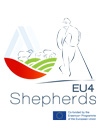EU Rural development policy
|
Course title: |
EU Rural development policy |
|
|
Course code: |
IFEUP |
|
|
ECTS: |
3 |
|
|
In-class hours |
Lectures: |
30 |
|
Laboratory work/Tutorials: |
0 |
|
|
Self-preparation hours |
Practical training: |
20 |
|
Other: |
25 |
|
|
Total hours: |
75 |
|
|
Language: |
English |
|
|
Study cycle: |
BSc, Master |
|
|
Semester: |
Winter, summer |
|
|
Faculty: |
Faculty of Economics |
|
|
Name of the lecturer(s): |
Chief Assist. Prof. Krum Hristov, PhD |
|
|
Mode of delivery: |
Face-to-face, distance learning |
|
|
Prerequisites: |
Agricultural Economics Rural Development |
|
|
Learning outcomes of the course unit: |
The European rural areas are a vital part of its physical make-up and its identity. According to a standard definition, more than 91 % of the territory of the EU is "rural", and this area is home to more than 56 % of the EU's population. Furthermore, the EU's fantastic range of striking and beautiful landscapes are among the things that give it its character – from mountains to steppe, from great forests to rolling fields. Many of our rural areas face significant challenges. Some of our farming and forestry businesses still need to build their competitiveness. More generally, the average income per head is lower in rural regions than in our towns and cities, while the skills base is narrower and the service sector is less developed. Also, caring for the rural environment often carries a financial cost. The European Union has an active rural development policy because this helps us to achieve valuable goals for our countryside and for the people who live and work there. The course “EU rural development policy” covers the aims, objectives and powers of the interest groups and agencies involved in rural policy and evaluates their role in rural development, environmental protection, service and settlement planning. Lectures introduce students to contemporary policy debates and issues, linked to their wider reading, including hand-outs of up-to-date material. Tutorials discuss the planning of their essay topics and then give feedback on their analysis. By the end of the module students will be able to assess critically the contemporary institutions, policies and mechanisms of rural planning; to analyse rural policies from sociological and political perspectives; and to evaluate the role of various interests groups and agencies in rural planning processes. |
|
|
Course contents: |
1. The Principles of Rural Policy 2. History of Rural Policy 3. Agricultural Policy and Politics 4. Europeanisation of Rural and Environmental Policy 5. Rural Interest Groups 6. Demographic Pressures on Rural Areas 7. Settlement and Services Planning 8. Rural Community Development 9. Rural Social Exclusion 10. Economic Development and Rural Areas 11. Regional Policy and Rural Areas 12. Farming and Food in Rural and Regional Development. 13. Principles of the European Union's new policy for rural development 14. The financing of rural development in the EU 15. EU rural development objectives and guidelines 16. New generation of rural development strategies and programmes 17. Rural development measures for EU candidate countries 18. Context for a better rural development 19. Required changes for RD policy after 2013 |
|
|
Recommended or required reading: |
1. M. Artis and F.I. Nixson, Economics of the European Union, 2007 (4th edition) Chapter 5 in Third edition. 2. D. Blanford ea., Policy Reform and Adjustment in the Agricultural Sectors of Developed Countries, CABI Publishing, Oxford, 2006. 3. A.M. El-Agraa, The European Union. Economics and Policies, Prentice Hall, 2004, Chapter 20. 4. A. Greer, Agricultural Policy in Europe, Manchester, 2005. 5. M. Hennis, Globalization and European Integration: The Changing Role of Farmers in the Common Agricultural Policy, 2004. 6. W. Molle, The Economics of European Integration. Theory, Practice, Policy, Aldershot, 2006, Chapter 9. |
|
|
Planned learning activities and teaching methods: |
The main part of the material in EU Rural Development Policy is taught by lectures. During the tutorials, the students solve cases related to the lectures’ material. To illustrate the process of decision making a "game" approach will be used, where the students are given certain roles and are required to decide on the allocation of resources. |
|
|
Assessment methods and criteria: |
Students’ knowledge evaluation system in the subject “EU Rural Development Policy” includes the total grade is defined in a six-point marking system, the lowest passing grade being ‘Average (3)’. Regular attendance and taking part in discussions - 15%, Paper and team project - 10%, Tests - 10%, Group tasks - 5%. Exam /test/ – finalizing the semester grade - 60%. |
|
 - Събития по случай 80-я юбилей на АУ
- Събития по случай 80-я юбилей на АУ











